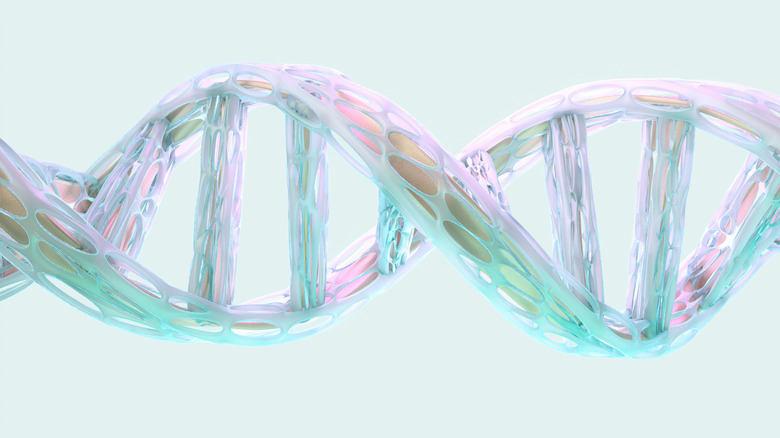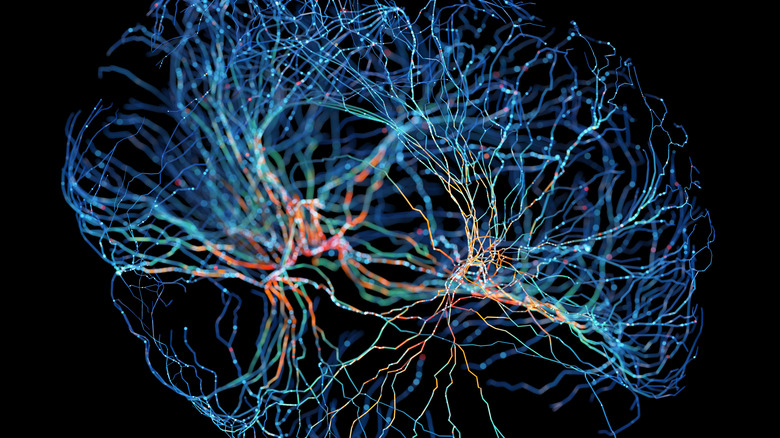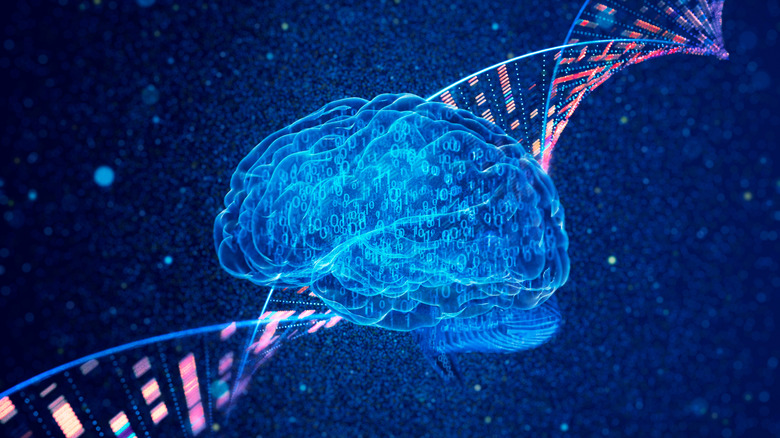No, Your Intelligence Doesn't Just Come From Your Mom's Genes
Intelligence is a tricky thing. For such an important aspect of our existence, the term isn't all that well-defined and certainly isn't the most easily measurable attribute. Intelligence can refer to our ability to acquire and apply knowledge, but it also applies to our capacity for logic, self-awareness, empathy, creativity, critical thinking , and problem-solving. What's more, there's an ongoing debate about whether IQ tests are an accurate measure of intelligence and there's even a lack of consensus on what IQ actually means.
So, when multiple news reports cropped up back in 2016 claiming that our intelligence comes mainly from our mothers, it was bound to provoke some pushback. The reports were primarily based on a blog post that used data from studies conducted between 1972 to 2012, and didn't necessarily interpret that data entirely accurately. It led to a flurry of eye-catching headlines, but the truth is that intelligence is a lot more complicated, and simply arguing that it comes mostly from the maternal side misses many key points.
In simple terms, the argument that intelligence comes from moms boils down to chromosomes. Males have one X and one Y chromosome, while females have two X chromosomes. It's argued that X chromosomes contain important IQ genes, and since boys can only receive an X chromosome from their mother, that must mean they also receive their intelligence from the maternal side. Not only does this grossly oversimplify the situation, it misses the point that, by this logic, girls would receive IQ genes from their father since males provide an X chromosome to their daughters.
So, if intelligence doesn't come from your mom's side of your genetics, where does it come from? Well, as you might expect, answering that question is a lot more difficult than simply saying one of your parents is responsible.
The argument for moms contributing more to intelligence
Before we get into where intelligence might actually come from, it's worth exploring why it is that arguments claiming such an attribute comes from moms gained so much traction. A big part of this theory seems to have come from a 2006 study published in The British Medical Journal, which looked at the effect of breastfeeding on cognitive ability. Researchers compared pairs of siblings who were and weren't breastfed, and found that "maternal IQ has the largest independent effect" on a child's IQ. However, there was no measure of paternal intelligence included in the study, meaning that the link between paternal IQ and a child's own remains mysterious. It could, for instance, be that paternal IQ is linked with the IQs of children even more so than maternal IQ.
Other studies cited in support of the "intelligence comes from your mom's genes" argument included a series of experiments carried out on mice decades ago. If you want to use these studies to back up the claim about maternal influence on cognitive ability, you could interpret the results as pointing to female genes contributing more to the cerebral cortex, the part of the brain that handles essential functions such as memory, thinking, learning, reasoning, problem-solving, and more. Male mice genes, meanwhile, were shown to contribute more to the limbic system, a neural network that handles emotions, memory, motivations, and unconscious drives.
However, these tests carried out on mice don't necessarily transfer to human beings, and there's plenty of reason to believe the actual basis for our intelligence is much more complicated than simply "mom's genes make the smart part of our brain." That's not to say that mothers don't contribute more to intelligence, just that it's not clear exactly how our own intelligence is formed at this point.
What we do know about the source of intelligence
Much of the research used to back up claims about moms contributing more to intelligence is somewhat outdated, at least in comparison to more recent studies. If nothing else, these studies show that intelligence comes from a combination of numerous genes likely from both parents. A 2014 study published in PLOS One, for example, detailed a genome-wide association study for general cognitive ability in 7,100 participants who had been given IQ tests and provided a DNA sample to the researchers. Their findings suggest a substantial heritability of general cognitive ability arising from "a very large number" of single nucleotide polymorphisms (SNPs) — a type of genetic variation among people's DNA.
A separate 2015 study published in Molecular Psychiatry looked at the genetic contribution to variation in general cognitive function and found multiple genome-wide significant SNP associations. In 2016, another study in Molecular Psychiatry noted that previous genetic analyses had struggled to identify specific "loci" — the exact location on a chromosome where a particular gene or genetic marker sits — responsible for cognitive ability's heritability, which puts the claim that maternal genes are responsible for our intelligence into perspective. Likewise, a 2018 study of 300,486 individuals published in Nature Communications, which found 148 genome-wide significant independent loci associated with general cognitive function on autosomal chromosomes — i.e. the 22 pairs of chromosomes that are not the X or Y chromosomes. As such, neither this study nor any of the others identified key intelligence genes on the X chromosome, which forms a significant part of the argument for mother's providing the intelligence genes for their children.
These are just some examples of studies that hint at a much more complex picture of the heritability of intelligence, wherein multiple genes play small roles in shaping our cognitive abilities, which in the aggregate make up our intelligence. But there's even more to this already complicated picture.
Environment and experience play a big role in our intelligence
In a 2022 review of 10 years worth of molecular genetic (DNA-based) research on intelligence, published in Molecular Psychiatry, researchers concluded that there were "large numbers of independent genetic variants, each of which accounts for a tiny proportion of intelligence variation," once again pointing to a complex genetic basis for intelligence that goes well beyond "your mom's genes make you smart." But beyond the genetic origins of intelligence, there are several other factors that play a role in defining this particular attribute in us all.
Genes are generally thought to account for around half of our intelligence, with some suggesting it could be higher than that. But environment and life experience are also important factors here. A 2012 study published in PLOS One looked at the link between a father's age and the child's intelligence. While there was a link between lower child intelligence and younger and older fatherhood, the researchers determined that our parents' education, our socioeconomic status, and whether we have any siblings may play an equally important role in cognition.
In an article in the journal Psychological Bulletin, researchers showed how intelligence can be both heritable and malleable, meaning that even though we inherit much of our intelligence via genetics, we can actually improve or degrade our intelligence over the course of our lives. As such, the authors provide an explanation of intelligence that takes into account genetic and environmental influences on individual differences in IQ, even noting that researchers have "struggled to identify intelligence-related genes (also known as IQ's 'missing heritability')." With all this in mind, you should at the very least be skeptical of claims that our intelligence comes solely from our mothers.



